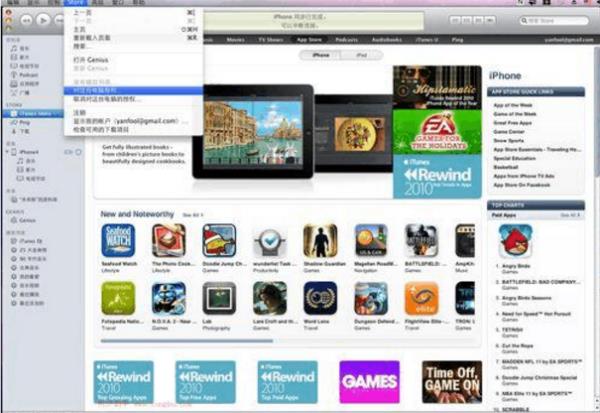iphone连接到iTunes后被同步的文件去哪了?
Posted
tags:
篇首语:本文由小常识网(cha138.com)小编为大家整理,主要介绍了iphone连接到iTunes后被同步的文件去哪了?相关的知识,希望对你有一定的参考价值。
要找回被同步的文件,可采取以下操作:
1、启动iTunes 将iPhone连接到电脑,通常iTunes会自动启动,如果没有启动,手工启动它。iTunes有可能提示你有新版本,是否需要升级,回答“否”,不要轻易升级!

2、设置iPhone名字 这只有在第一次连接iPhone才会出现,
3、汇总屏幕 检查是否有升级文件。如果iPhone处于Recovery方式,这个功能就变成了恢复iPhone系统。慎用!不要随便恢复系统,即使恢复也要手工选择恢复的版本!

iTunes同步软件到iPhone 的方法:
1. 先[登录]iTunes帐号,如果没有,点击[创建账户]。
2.登录后,用iTunes帐号[对这台电脑授权]。

3.进入AppStore选择一款软件,如果是免费软件,点击[Free],即可下载,第一次下载需要输入帐号密码。输入帐号密码后,点[获得]。开始下载软件,我们可以在[下载]看到下载进度去[应用程序]查看已下载的软件。
参考技术A 点击桌面--我的文档--我的音乐--itunes--iTunes Media---Mobile Applications////其实 在itunes media文件夹里就是同步或者备份的内容存放地。追问但是我进去了是空的啊。我没同步之前下载的游戏那些全没了。文件也没了。
追答你打开看itunes的偏好设置里的高级,看路径是那个,如果你更改过,根据那个路径找,如果没有的话,请问你现在如果将手机里的应用传过去后能显示在里面吗?
如果能,下载的应该在iTunes Media文件夹的Dowload文件夹里
没有。它就是我第一次连接到iTunes 就弹出个选个框。意思就是不同步的话手机上的应用软件会被全部移除。我就点了同步。但是同步过后我手机上的应用程序就没了。那些是在91里下载的。现在手机上都没显示
追答噢,你已经删除了。如果真的同步的话,手机上的是不会消失的。
现在你可以将手机连接到91上,尝试应该可以恢复的。
Fuck 那不是坑爹么。同步与不同步都会被删除。我勒个擦! 谢谢了啊!
参考技术B 楼上的情况应该是没有设置对,首先帐号问题,再有就是同步的方向性问题,再说91的软件是越过的,所以会有你这种情况咯。追问
谢谢啊谢谢。
追答客气了,心态好点,反正下游戏走WIFI也挺快的。
在 C# 中开发类似 iTunes 的应用程序
【中文标题】在 C# 中开发类似 iTunes 的应用程序【英文标题】:Developing iTunes like application in c# 【发布时间】:2013-11-07 04:37:58 【问题描述】:我需要用 c# 开发一个应用程序,它可以在 iPhone 连接到系统时自动检测它并读取 iPhone 文件系统的特定文件。我基本上希望这个文件自动从设备下载到 PC。我使用了 USBpcap 工具,该工具建议 iTunes 使用某种 XML 格式连接到手机。非常感谢任何帮助或见解。是否有任何第三方 API 文档可以帮助我入门?有一些应用程序可以复制 iTunes 功能,例如 Copytrans
Apple 是否提供任何协议或 API?
我一直在挖掘互联网并找到此链接Layered communication for iPhone。 此外,我正在使用 LibUsbDotNet 库与 USB 设备进行通信(Example)。任何人都可以建议应该使用哪些端点。
在我看来,我必须在 Windows 应用程序中实现 usbmuxd。它是一个多层协议。一定有一些库实现了usbmuxd(我认为我不必自己实现协议)
我不太了解 iTunes 通信以及 USB 通信。我正在尽可能多地添加信息(当然还有我在研发中提出的东西)。非常感谢任何帮助。
public static DateTime LastDataEventDate = DateTime.Now;
public static UsbDevice MyUsbDevice;
#region SET YOUR USB Vendor and Product ID!
public static UsbDeviceFinder MyUsbFinder = new UsbDeviceFinder(1452, 4768);
#endregion
private void LibUSB()
ErrorCode ec = ErrorCode.None;
try
// Find and open the usb device.
MyUsbDevice = UsbDevice.OpenUsbDevice(MyUsbFinder);
// If the device is open and ready
if (MyUsbDevice == null)
throw new Exception("Device Not Found.");
// If this is a "whole" usb device (libusb-win32, linux libusb)
// it will have an IUsbDevice interface. If not (WinUSB) the
// variable will be null indicating this is an interface of a
// device.
IUsbDevice wholeUsbDevice = MyUsbDevice as IUsbDevice;
if (!ReferenceEquals(wholeUsbDevice, null))
// This is a "whole" USB device. Before it can be used,
// the desired configuration and interface must be selected.
// Select config #1
wholeUsbDevice.SetConfiguration(1);
// Claim interface #0.
wholeUsbDevice.ClaimInterface(0);
// open read endpoint 1.
UsbEndpointReader reader = MyUsbDevice.OpenEndpointReader(ReadEndpointID.Ep03);
// open write endpoint 1.
UsbEndpointWriter writer = MyUsbDevice.OpenEndpointWriter(WriteEndpointID.Ep02);
int bytesWritten;
ec = writer.Write(usbmux_header.GetBytes(), 2000, out bytesWritten);
if (ec != ErrorCode.None)
throw new Exception(UsbDevice.LastErrorString);
byte[] readBuffer = new byte[1024];
while (ec == ErrorCode.None)
int bytesRead;
// If the device hasn't sent data in the last 100 milliseconds,
// a timeout error (ec = IoTimedOut) will occur.
ec = reader.Read(readBuffer, 10000, out bytesRead);
if (ec == ErrorCode.Win32Error)
throw new Exception("port not open");
if (bytesRead == 0)
throw new Exception("No more bytes!");
// Write that output to the console.
Console.Write(Encoding.Default.GetString(readBuffer, 0, bytesRead));
catch (Exception ex)
Console.WriteLine();
Console.WriteLine((ec != ErrorCode.None ? ec + ":" : String.Empty) + ex.Message);
finally
if (MyUsbDevice != null)
if (MyUsbDevice.IsOpen)
// If this is a "whole" usb device (libusb-win32, linux libusb-1.0)
// it exposes an IUsbDevice interface. If not (WinUSB) the
// 'wholeUsbDevice' variable will be null indicating this is
// an interface of a device; it does not require or support
// configuration and interface selection.
IUsbDevice wholeUsbDevice = MyUsbDevice as IUsbDevice;
if (!ReferenceEquals(wholeUsbDevice, null))
// Release interface #0.
wholeUsbDevice.ReleaseInterface(0);
MyUsbDevice.Close();
MyUsbDevice = null;
// Free usb resources
UsbDevice.Exit();
class usbmux_header
public static UInt32 length = 10; // length of message, including header
public static UInt32 reserved = 0; // always zero
public static UInt32 type = 3; // message type
public static UInt32 tag = 2; // responses to this query will echo back this tag
public static byte[] GetBytes()
byte[] lgth = BitConverter.GetBytes(length);
byte[] res = BitConverter.GetBytes(reserved);
byte[] tpe = BitConverter.GetBytes(type);
byte[] tg = BitConverter.GetBytes(tag);
byte[] retArray = new byte[16];
lgth.CopyTo(retArray, 0);
res.CopyTo(retArray, 4);
tpe.CopyTo(retArray, 8);
tg.CopyTo(retArray, 12);
return retArray;
;
我一直在尝试向 iPhone 发送 hello 数据包字节,但我无法从手机读取任何响应。
【问题讨论】:
我也在尝试这样做。你有什么运气吗? 【参考方案1】:您可以使用imobiledevice-net。它提供了一个 C# API 来使用您的 PC 连接到 iOS 设备。
例如,要列出连接到您的 PC 的所有 iOS 设备,您可以运行以下命令:
ReadOnlyCollection<string> udids;
int count = 0;
var idevice = LibiMobileDevice.Instance.iDevice;
var lockdown = LibiMobileDevice.Instance.Lockdown;
var ret = idevice.idevice_get_device_list(out udids, ref count);
if (ret == iDeviceError.NoDevice)
// Not actually an error in our case
return;
ret.ThrowOnError();
// Get the device name
foreach (var udid in udids)
iDeviceHandle deviceHandle;
idevice.idevice_new(out deviceHandle, udid).ThrowOnError();
LockdownClientHandle lockdownHandle;
lockdown.lockdownd_client_new_with_handshake(deviceHandle, out lockdownHandle, "Quamotion").ThrowOnError();
string deviceName;
lockdown.lockdownd_get_device_name(lockdownHandle, out deviceName).ThrowOnError();
deviceHandle.Dispose();
lockdownHandle.Dispose();
【讨论】:
【参考方案2】:据我了解,一次只有一个客户端可以使用 USB 连接到 iOS。在 macOS 和 Windows 上,一个客户端是 usbmux。该库与更高级别的客户端多路复用 TCP 连接,包括 iTunes、Photos 和(在 macOS 上)开源 peertalk 库。
因此,在 Windows 上,您不想实现自己的 usbmux,而是希望在其之上实现一个客户端,类似于 peertalk。我还没有看到任何开源软件可以做到这一点,但许多开发人员已经使用他们自己的专有软件完成了它。
如果其他人有关于在 Windows 上使用 usbmux 的建议,我很想听听。
——戴夫
【讨论】:
【参考方案3】:要玩 ipod 你可以使用SharePodLib
【讨论】:
以上是关于iphone连接到iTunes后被同步的文件去哪了?的主要内容,如果未能解决你的问题,请参考以下文章
无法在 SKStoreProductViewController 中连接到 iTunes Store
iPhone In-App Purchase Store Kit 错误 -1003“无法连接到 iTunes Store”